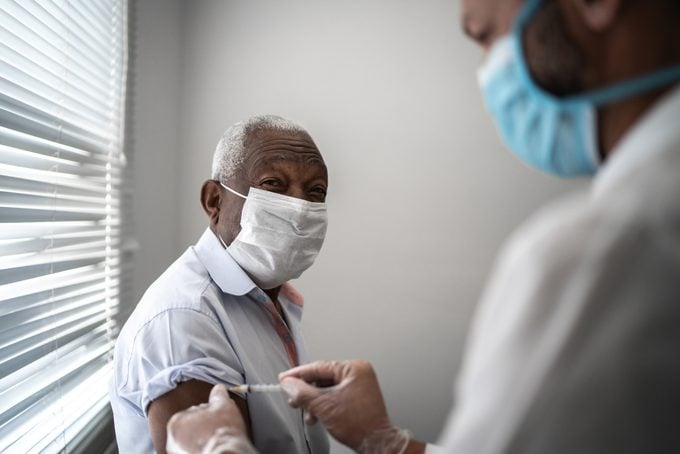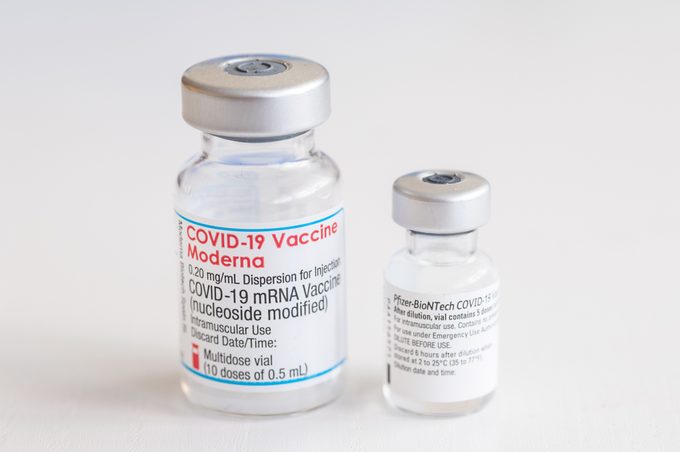9 Things to Know About Covid Vaccine Booster Side Effects
Updated: Mar. 30, 2022
Covid-19 boosters are now recommended for almost everyone. Find out if you need to worry about side effects.
The booster basics
According to the Centers for Disease Control and Prevention (CDC), more than 55 million Americans have already received a booster at the time of this publication. Also, the CDC has recommended the booster for everyone 16 years and older “six months after completing your primary Covid-19 vaccination series.”
As more and more people schedule booster shots to protect them against Covid-19, many are wondering: Are the side effects of Covid boosters different than side effects from the original shots? Are they more or less severe?
Here, experts in science and medicine share their knowledge about the side effects of the Covid-19 booster, and how these compare to the first Covid-19 vaccination series.
What is a booster?
It’s normal for antibody protection from a vaccine to wane over time, making it necessary for most individuals to boost the immune system’s memory, says Vincent Hsu, MD, the executive director of infection control at AdventHealth, a health system operating in 10 states.
Some other vaccines, including tetanus, also have boosters. Boosters are for healthy people, which makes them different from the “additional primary shot” following the primary Covid-19 vaccination that the CDC recommends “for some moderately or severely immunocompromised people.”
People with weakened immune systems, on the other hand, “have a smaller response [from the initial vaccines], and the way to keep their immune system as intact as possible is to continually give these shots,” explains Dr. Hsu.

Covid-19 booster side effects are similar to those from the first vaccination series
A CDC study published in October found that side effects from Pfizer and Moderna vaccines mirrored those seen with the original vaccines. These were mainly a sore arm and mild-to-moderate headaches, muscle aches, chills, fatigue, fever, and joint pain. All were temporary, and in general, the boosters are well tolerated, as a preliminary report soon to be published in the British Medical Journal suggests.
How Covid-19 booster shot side effects are different from the initial shots
Some individuals had fewer side effects than from their original shots, and some more, says William Schaffner, MD, a professor of preventive medicine and infectious diseases at Vanderbilt University School of Medicine.
However, says Dr. Hsu, there does not seem to be a strong correlation between the severity of reactions seen with the earlier shots versus the booster. “It’s hard to predict,” he tells TheHealthy. “Just because you didn’t have side effects after your primary shots doesn’t mean you won’t have them after the booster and vice versa.”
That said, Beth Oller, MD—a practicing family physician in Stockton, Kansas—reports that most of the side effects she’s seeing in her patients (and herself) have been mild, often only a sore arm.
Meanwhile, Dr. Schaffner reveals his own reaction to the booster was slightly worse than before: a sore arm for three days instead of two, and he went to bed early that night. “It was certainly not disabling,” he says.
Serious side effects to the Covid-19 booster are rare
There were reports of some serious side effects such as anaphylaxis (a sometimes life-threatening allergic reaction) and blood clots with the initial Covid-19 vaccines, but these were incredibly rare. The CDC estimates that anaphylaxis occurred in no more than two to five people per million who were vaccinated with the original vaccines.
(Note: On December 16, 2021, the New York Times reported that CDC advisers “cited increasing evidence that the [Johnson & Johnson Covid-19] shots can trigger a rare blood clot disorder now linked to dozens of cases and at least nine deaths in the United States in the last year.”)
On the whole, one December 2021 study published in The Lancet reports that about five percent of vaccine recipients had serious reactions. Still, these were limited to commonly seen side effects like chills and fatigue. “Nothing we have heard suggests that any of these serious side effects is increased because of a booster,” says Dr. Hsu.
(Learn about Covid vaccine myths no one should fall for.)
Mixing and matching vaccines doesn’t affect side effects

The CDC has stated that people do not need to receive a booster with the same brand of vaccine they initially received. For example, if you got two Pfizer shots as part of your primary series, it’s OK to get Moderna for your booster. This effectively deters SARS-CoV-2, the virus that causes Covid infection, and there’s no evidence it changes the booster recipient’s side effects.
“If you’re having a hard time deciding which booster shot is right for you, your family physician can help you make that decision,” says Dr. Oller.
(This is what to do if you missed your second Covid-19 vaccine.)
Having a flu shot at the same time won’t increase side effects
Not only is the Covid-19 pandemic still in full swing, but flu season is also booming thanks to less mask-wearing, more variants, and more travel.
As always, health officials recommend that everyone six months and older (with some exceptions) receive a flu shot.
And there’s no reason you can’t get the flu and Covid vaccines at the same time, albeit in different arms, says Gregg Sylvester, MD, the chief medical officer at Seqirus, one of the world’s largest influenza vaccine providers. “There’s real-world evidence showing when you give a booster and an influenza shot, you do not see a rise in adverse events,” says Dr. Sylvester.
He adds that so far this year, the influenza vaccine seems to be a good match to the strains of that disease that are circulating.
Covid vaccines reduce illness
With the current increase in Covid-19 cases, it may be tempting to believe the vaccines don’t work. However, Dr. Schaffner says it’s important to note that 90 percent of people hospitalized with Covid-19 are unvaccinated.
Also, adds Dr. Oller, it would be scientifically impossible for the Covid-19 vaccine to eliminate all infections. “They wanted to prevent severe illness, hospitalization, and death, and they do that phenomenally well,” she says. “It’s not 100 percent, but if you get a vaccine, you’re probably not going to die.”
Boosters protect individuals against Omicron
Getting a third booster will help ward off the Omicron variant. That’s welcome news, considering Omicron is poised to surpass Delta as the world’s dominant strain.
Covid can be worse than any vaccine side effect
While many cases of Covid can be mild and some have no symptoms at all, about 800,000 people in the U.S. have died from infection. Many more have ended up on ventilators in the hospital, and many are dealing with long Covid. So when you’re weighing the risks, says Dr. Oller, “There’s no comparison between vaccine side effects and Covid.”
In other words, if you can get the Covid-19 booster… you should.



